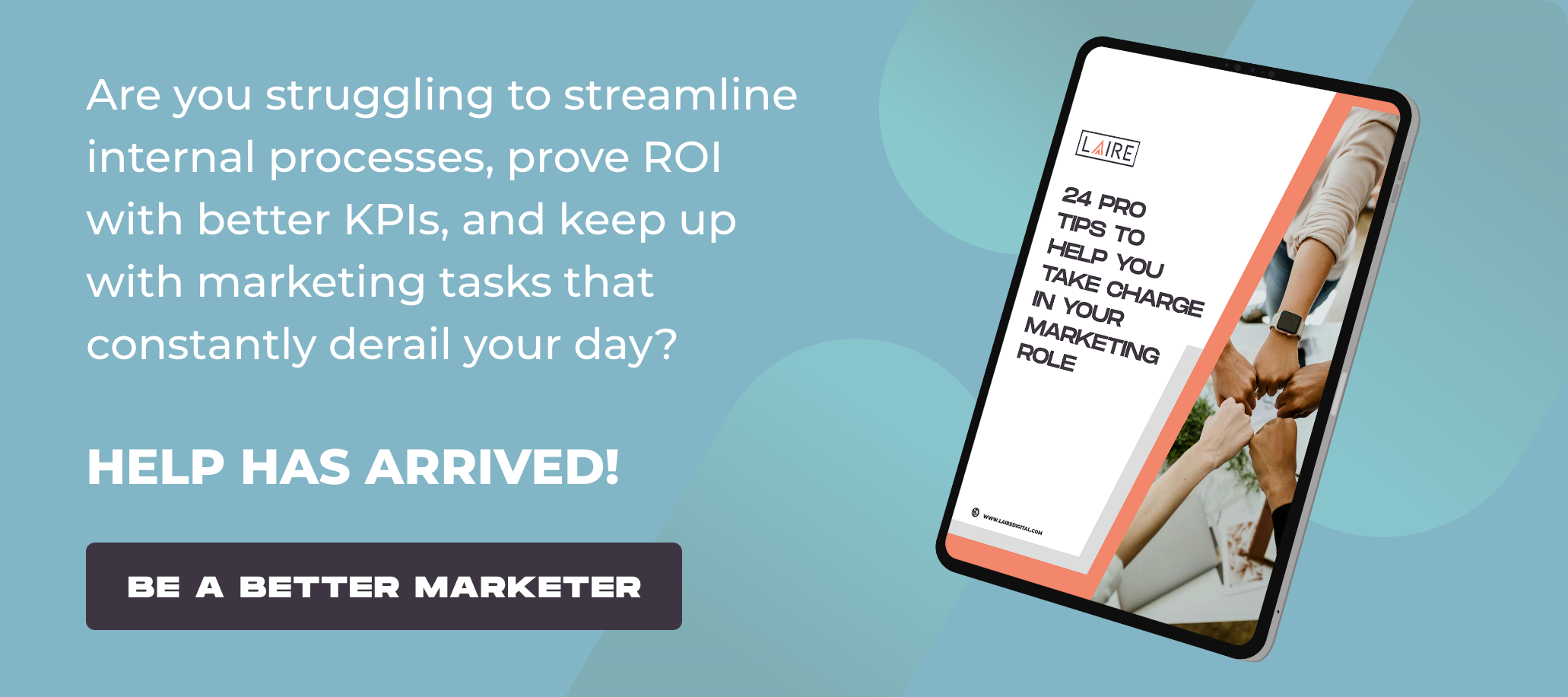Picture this: It’s 3 o’clock on a Friday afternoon. You’re getting ready to wrap up the week. You’ve got plans to look forward to later and a weekend full of relaxation and catching up on your favorite shows.
Knock knock knock…
You look up from your desk and see your marketing manager standing in the doorway.
“Hey, boss, got a second?”
You get a tight feeling in your stomach — you know what’s coming next.
The dreaded “I’m-putting-in-my-two-weeks-notice” speech.
Then it hits you. You’ll have to find a replacement — which could take weeks or even months — you’ll have to train them, and what do you do in the meantime? Who is going to handle all of your marketing projects and tasks? The clock is ticking.
After you’ve stopped banging your head against the wall, what you need is a game plan.
Let’s talk about what that should look like.
Immediate Next Steps
In the face of unexpected personnel changes such as these, you need to act, and you need to act quickly. The more quickly you start setting up a plan, the more likely that you’ll be able to mitigate disruptions and ensure continuity within the marketing department.

Here are the first steps you need to take when receiving a 2-week notice from your marketing manager:
Notify Relevant Stakeholders and Team Members
As soon as you receive the resignation notice, notify your key stakeholders immediately. Department heads and other executives who may be directly impacted by the departure need to know right away.
Then, you’ll want to set up a meeting with your marketing team (if you have one) to communicate the news and reassure them of your company's commitment to maintaining operations as close to normal as possible. Be sure to also mention that you plan on providing as much support as needed during the transition period.
Schedule an Exit Interview
Arrange an exit interview with the marketing manager to understand exactly why they’re leaving. Is it for higher pay? Better benefits? Or perhaps it’s because of company culture.
Getting this information will help you understand whether there was anything you could have done better and can address any underlying issues between you, the marketing manager, and the entire marketing department.
This meeting will also help you get feedback on a range of things: how the marketing department is normally run, any important projects to note, and general team dynamics.
Secure Access to Accounts, Passwords, and Knowledge Transfer
One of the most important steps to take is securing access to your accounts, marketing tools, and platforms that were previously managed by the marketing manager.
Then, start a comprehensive knowledge transfer process to pass on important information, contacts, and insights to the remaining marketing team members or a designated acting manager.
Assess Ongoing Projects and Campaigns
Conduct a thorough assessment of ongoing marketing projects, campaigns, and deliverables to identify any potential gaps or disruptions that might result from your marketing manager putting in their resignation.
Determine the status of each project, delegate responsibilities as necessary, and make sure to establish clear lines of communication to help the team stay on track with timelines and client deliverables.
Conduct a Skills and Responsibilities Audit for the Marketing Team
Now, it’s time to evaluate the skills, expertise, and workload distribution within the marketing team itself. This will allow you to identify areas of strength and areas that might need some additional support or restructuring.
Clarify roles and responsibilities so everybody on the team knows what’s expected of them, and consider cross-training or professional development so that your marketing team remains equipped to meet upcoming deadlines and complete projects efficiently.
By addressing these steps first, you’ll maintain operational continuity and position the marketing department for a successful transition period.
Developing a Transition Plan
You’ve taken care of the initial steps. Now, it’s time to start working on a transition plan.
The first thing you want to do is establish a timeline for this transition period.
Can your former marketing manager stay longer than the allotted 2-week timeframe? If so, you’ll gain a cushion of time to find a replacement and get things in order. Not to mention, if you find a replacement early, the marketing manager may even be able to help train the new hire.
Let’s stick with a 2-week time frame for now and assess what steps you need to take:
- Create a checklist of everything you want the marketing manager to complete before they leave. This will help keep things organized and prevent anything from falling through the cracks during their transition.
- Meet with them every day. The reality is that the person leaving may have “checked out,” so you’ll want to keep them focused so they complete all the tasks you need before their departure. Daily meetings also allow you to conduct open two-way feedback, which will help you better understand the marketing manager role and how you can facilitate an easier transition for a new hire coming onto the team.
- Delegate responsibilities and tasks among existing team members. Rather than doing everything yourself or piling the work onto one other person, find out what the most important tasks are and assign them to different members of your team.
It’s crucial that you stay calm during this transition and realize that things will slowly fall into place. These action items help you do that by getting you on track with current projects and maintaining operational efficiency.
What to Do Before You Search for a Replacement
Before you begin any sort of hiring process, you need to make sure that your needs and objectives for the marketing manager role are well-defined, clear, and aligned with your company's core values. Here’s what you can do before you begin hiring for a smoother experience:

Define the Role and Responsibilities of the New Marketing Manager
The role your marketing manager originally took on very likely has evolved and changed. As time passes and the industry you’re in grows, the tasks for your marketing team will change too.
You’ll want to start by revisiting and refining the role and responsibilities associated with the marketing manager position. Consider the needs of the entire marketing department and the priorities of your organization. Clearly outline the scope of the role, including key deliverables, objectives, reporting structures, and expectations for their performance and leadership.
Update and Enhance the Job Description
Based on the revised role definition from above, update the job description for the marketing manager position to reflect the desired qualifications, skills, and experience you want to see in your potential hires.
Exhibit any opportunities for growth or advancement, and make sure that the job description is comprehensive, engaging, and accurately represents your brand and values to attract the top talent.
One thing to note: Here’s where you should clearly define your company culture. Remember to hire not only based on skill but on core values as well. This helps ensure your new hire will be a great fit for the entire team and will hopefully prevent additional turnover.
Leverage Recruitment Channels and Networks
To reach a wide range of high-quality candidates, leverage the power of recruitment platforms and professional networks.
Post the job listing on reputable job boards and professional networking sites like LinkedIn and Indeed and on your company’s website. You can also tap into internal referral programs and hire from within, or you can partner up with recruitment agencies or headhunters who specialize in filling marketing roles.
This proactive approach lays the foundation for a successful recruitment process and helps you set the stage for a great hire who aligns with your core values.
Options for Filling the Role
Now, you’re ready to think about how to fill the marketing manager position. There are several routes you can take, each depending on an accurate view of your current and future needs and what will benefit your company and your team best.
Hire a New Employee
By hiring a brand new full-time employee to fill the marketing manager role, you’re getting access to someone who is solely dedicated to your business and its success. You’re able to train them to become part of a team that works toward achieving your company’s biggest goals.
You can also explore the idea of hiring a part-time employee if some marketing tasks can be delegated to existing team members.
Promote From Within
Hiring from within your company means that training will most likely be less intensive than with a completely new hire. A current employee is already familiar with your company culture and different teams, which means they’ll fit in quickly.
It also minimizes recruitment costs and onboarding time and creates more stability within the marketing department.
Use a Virtual Assistant to Handle Some or All of the Tasks
This option offers a lot of flexibility when delegating tasks and can be quite cost-effective compared to hiring a full-time employee. It provides access to specialized skills and expertise without the overhead of a permanent hire.
Although you won’t have an in-person, full-time employee, a virtual assistant allows for scalability and lets you adjust support levels as needed.
Hire Contractors
Hiring contractors or freelancers offers the most flexibility and gives you access to a wide range of specialized skills. You can cut costs by hiring on a project-by-project basis, which reduces overhead costs that often come with full-time employment, like benefits and insurance.
Hire a Marketing Agency
With an agency, you get access to a full-service team of seasoned professionals with a diverse skill set and plenty of industry experience. You’ll get a comprehensive range of marketing services all under one roof, which takes the load off of managing day-to-day marketing operations.

Another benefit is that an agency will never knock on your door telling you they’re quitting. Turnover doesn’t exist when you hire an agency unless you initiate it. When you partner up with an agency for your marketing needs, you’ve got a steady partner who you can rely on for years to come.
Ultimately, the most suitable option for filling your marketing manager role will depend on factors like budget, how urgently you need the role filled, and the specific skill sets and expertise you need to drive your marketing initiatives forward.
Tips for Employee Morale and Retention
Focusing all your energy on filling the marketing manager role isn’t a wise idea. You also need to make sure that your current employees are taken care of during this transition, as it affects them just as much as it affects you.
Maintaining a high employee morale helps stabilize the marketing department and keep things flowing smoothly. Make sure you let your other employees know they’ll get all the necessary support they need, and encourage them to come to you with any suggestions, feedback, or concerns.
Here’s where a great company culture can be the saving grace of your organization.
Employees who feel cared for and respected will go above and beyond to make this transition as smooth as possible for everyone involved, including clients. By creating an environment where every voice is heard and valued, you empower your team to actively contribute to the transition process and feel invested in the outcome.
It’s also a good idea to recognize any team efforts and acknowledge their resilience and adaptability during the transition period. Celebrate achievements, no matter how small, to help breed motivation and create a positive work environment — which is always a great magnet for top talent.
Onboarding Your New Marketing Lead
Well, you’ve made it!
You’ve filled the marketing manager role. Now, your biggest priority is their onboarding process.
Setting up a solid onboarding process ensures that any future new hire can seamlessly enter into the daily operations without skipping a beat.
This encompasses everything from preparing their designated workspace (unless they’re remote) and providing access to the necessary tools and systems that the team uses.
You’ll need to schedule an orientation to familiarize them with the company's mission, values, and organizational structure and set up training sessions to go over their specific responsibilities.
Remember to introduce them to their teammates and any other key company members. Relationship-building is a huge part of a successful onboarding process and helps you assess just how well the new hire is fitting in with the current company culture.
By following these steps, you can create an onboarding experience that sets your new marketing manager up for success and creates a strong foundation for their tenure with your organization.
Hiring for the Win
When an employee resigns, the best thing you can do is act fast. But before you act, you need to assess and clarify exactly what expectations you have for the role. Make sure to understand why the person is quitting in the first place. It’ll give you a lot of insight into the health of your internal team.
Once you’ve decided which route you’re going to take in the hiring process, be proactive. Take a strategic approach to hiring a new team member — and always keep in mind that you’re not just hiring a skill set: You’re hiring a human being who should add to your company culture and bring benefits that go beyond skills and expertise.
Taking your marketing roles to the next level starts with understanding your biggest challenges. Get the 24 Pro Tips for Marketers Guide and start crushing your marketing goals.


